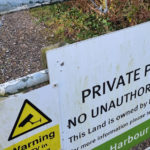A ‘proactive’ programme has been approved to tackle a backlog of food hygiene inspections on the Isle of Wight.
It comes after the issue was raised by the Isle of Wight council’s internal auditor.
The backlog included more than 200 food serving, making or selling businesses which were uninspected.
Staff shortage
However, there is a shortage of staff in the Isle of Wight council’s environmental health team to carry out the inspections and has been for years.
The position is further exasperated by the inability to recruit more officers despite multiple attempts.
The plan is based on managing risk and recognises the team is not able to achieve all of the intervention requirements for some lower risk premises, the council said.
The authority is not fully meeting the requirements of the Food Standards Agency (FSA) regarding the frequency of inspecting the more than 2,000 food establishments on the Island.
The backlog
As of 8th November 2023, there were 888 premises that were overdue a food hygiene inspection on the Island.
Earlier in the year, in February, the number stood at 1,118.
The FSA has, however, previously said it is assured by the council’s service and its plans to carry on.
The food safety body specifies how long there should be between inspections — ranging from six months to every three years — based on their risk rating.
Targeting resources where greatest need
The team is now targeting resources where there is the greatest need to protect the public’s health and make the most impact.
It focuses on the premises that are deemed the highest risk — those that have scored two or below in the national food hygiene rating scheme and the date since they were last inspected.
Rating new businesses a priority
The team has also given a priority to rating new businesses as they are failing to do so in a timely manner — 28 days as stated by the FSA — but there is some flexibility.
The council has said it recognises without any prior approval or licence, new businesses pose a risk as the operator may have very limited knowledge of food legislation, standards and safe practices.
The programme was approved by the cabinet member for community protection, Councillor Karen Lucioni at the end of January.
This article is from the BBC’s LDRS (Local Democracy Reporter Service) scheme, which News OnTheWight is taking part in. Some alterations and additions may have been made by OnTheWight. Ed





